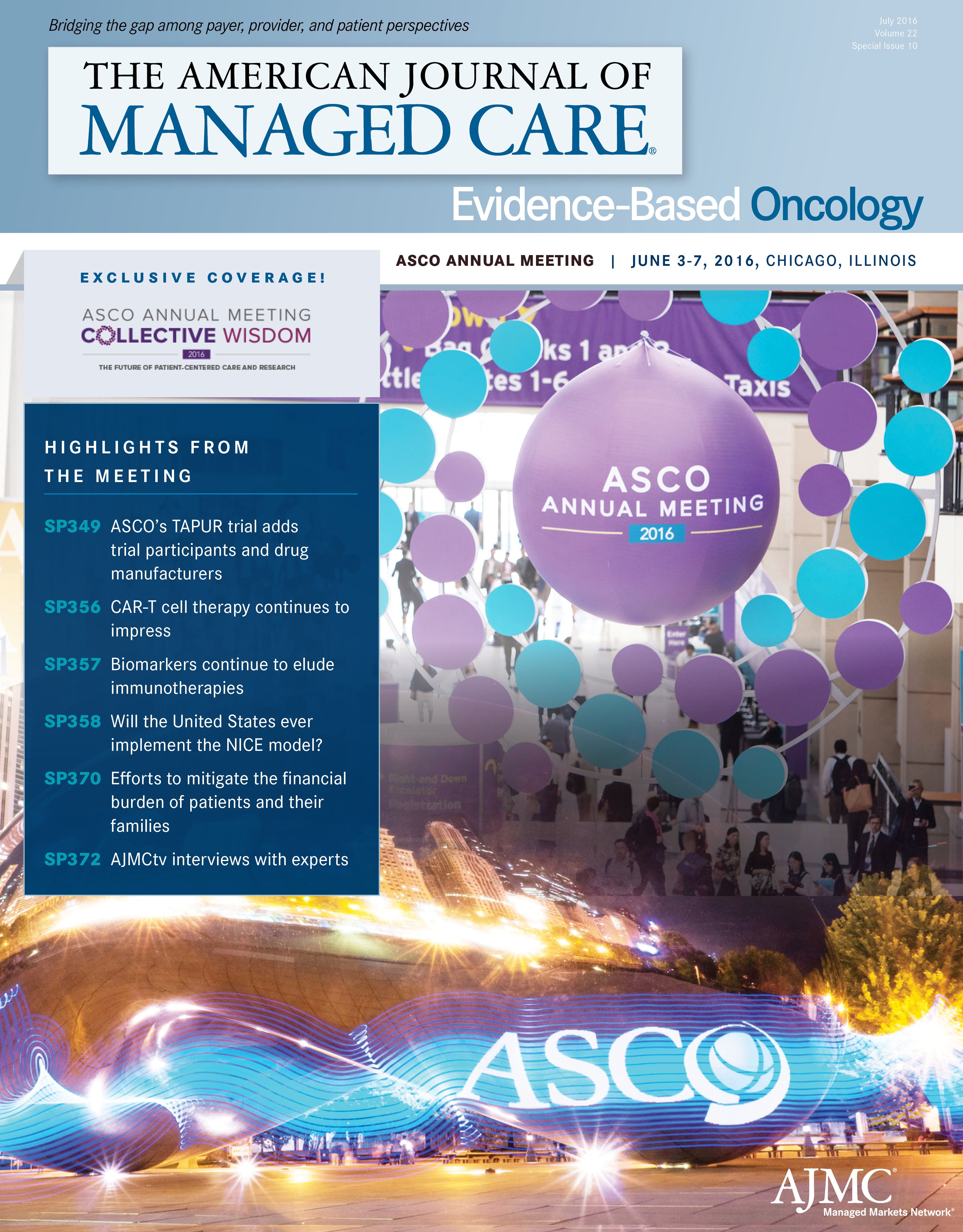- Center on Health Equity & Access
- Clinical
- Health Care Cost
- Health Care Delivery
- Insurance
- Policy
- Technology
- Value-Based Care
CAR-T Cells in Leukemia and Lymphoma
At the annual meeting of the American Society of Clinical Oncology, results were presented from a phase 1/2 trial in which patients with relapsed or refractory CD19+ B-cell malignancies were treated with CD19 CAR-T cells.
Cancer immunotherapy research has seen tremendous progress since the first checkpoint inhibitor, ipilimumab was approved in 2011. While combination immunotherapies are now being developed, they have their limitations because not all patients respond to the checkpoint inhibitors. Additionally, the absence of predictive biomarkers places limitations with respect to choosing positive responders for trial enrollment.
Chimeric antigen receptor T cells (CAR-T cells) are T cells genetically engineered to express a chimeric receptor on their cell surface. These cells are derived from the patient and then modified in vitro, before being reintroduced in the patient.1 This kind of immunotherapy has been gaining a lot of ground in clinical trials.
At the annual meeting of the American Society of Clinical Oncology, Cameron John Turtle, MBBS, PhD, Fred Hutchinson Cancer Research Center, presented results from a phase 1/2 trial in which patients with relapsed or refractory CD19+ B-cell malignancies received CD19 CAR-T cells. Rate of durable complete response in acute lymphocytic leukemia (ALL), non-Hodgkin lymphoma (NHL), and chronic lymphocytic leukemia (CLL), following immunotherapy with optimized lymphodepletion, was evaluated.
Thirty six patients with ALL were included in the trial, 33 of whom received products formulated in the defined composition; 26 were treated in an outpatient facility. Patients with ALL, Turtle said, had a high rate of minimal residual disease—negative complete response (CR), which was assessed using multiple techniques:
- Morphologic bone marrow
- Bone marrow by flow cytometry
- Deep sequencing
- Extramedullary disease
Turtle listed the 2 key observations for the patients with ALL:
- In a subset of patients treated with cyclophosphamide or cyclophosphamide/lymphodepletion, an anti-CAR immune response was observed.
- Addition of fludarabine to cyclophosphamide lymphodepletion improved CAR-T cell expansion and persistence.
Kaplan-Meier survival plots showed that over time, including fludarabine improved both disease-free and overall survival (OS) in patients with ALL.
Similarly, in patients diagnosed with NHL, the objective response rate (ORR) and CR was much improved following inclusion of fludarabine in the regimen. A high response rate in high-risk CLL patients was observed. In NHL, the ORR for patients treated with cyclophosphamide/lymphodepletion and fludarabine, was 84%. Additionally, CAR-T cell expansion and persistence, and OS and progression-free survival were better in patients whose regimen included fludarabine.
With respect to toxicity, Turtle said that overall the treatment is manageable. A majority of patients with ALL had very mild cytokine release syndrome (CRS); 90% with NHL had mild CRS, but did not require admission to the intensive care unit. Similarly, a majority of patients with CLL had mild CRS. The highest rate of neurotoxicity was observed in patients with ALL (39%), followed by CLL (23%), and least in NHL (20%).
Turtle concluded that adoptive therapy with CD19 CAR-T cells of defined subset composition results in durable CR in a high fraction of patients with relapsed/refractory ALL, NHL, and CLL. Optimizing the dosing regimen, he said, improved clinical outcomes in patients with ALL and NHL.
Expert Feedback
David L. Porter, MD, Lymphoma Program, Abramson Cancer Center, University of Pennsylvania, provided comments on the study presented by Turtle.
Porter explained that targeted cellular immunotherapy has the potential to overcome many limitations of conventional chemotherapy and other immunotherapy. CAR-T cells can be a perfect blend of antibody therapy, cellular therapy, and vaccine therapy, he said.
Porter was quite impressed by the data presented by Turtle, especially in patients with relapsed and refractory ALL. He added that, “Relapse after CR in CLL is unusual, and we expect the current CR rate of 25% to 45% will be sustained.”
There remain several unknowns with CAR-T cells, according to Porter.
- We are yet to identify the best CAR construct
- We don’t know the ideal cell composition
- Can they be switched on and off?
- Is there an ideal cell dose?
- What’s the ideal target?
- Can we combine CARs with other immune therapies?
Another limitation of this treatment, for both CLL and NHL, is the low CR rate of 25% to 50%. “How can this response rate be boosted?” asked Porter. To overcome some of these issues, Porter recommended developing a third-party donor of universal CAR-T cells.
EBO
In the future, Porter sees tremendous potential in tapping the synergism between CAR-T cells and checkpoint inhibitors. “Checkpoint activity may reduce CAR-T cell response, so it’s logical to combine the 2,” he concluded.
Reference
- Dangi-Garimella S. A new method to fight cancer: the body’s own immune system. The American Journal of Managed Care website. http://www.ajmc.com/journals/evidence-based-oncology/2014/august-2014/a-new-method-to-fight-cancer-the-bodys-own-immune-system. Posted August 25, 2014. Accessed June 20, 2016.

Telehealth Intervention by Pharmacists Collaboratively Enhances Hypertension Management and Outcomes
January 7th 2026Patient interaction and enhanced support with clinical pharmacists significantly improved pass rates for a measure of controlling blood pressure compared with usual care.
Read More
